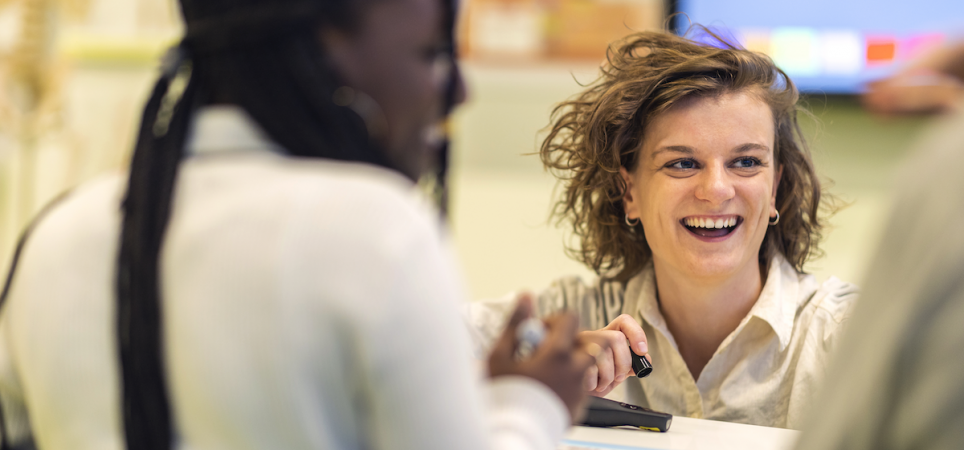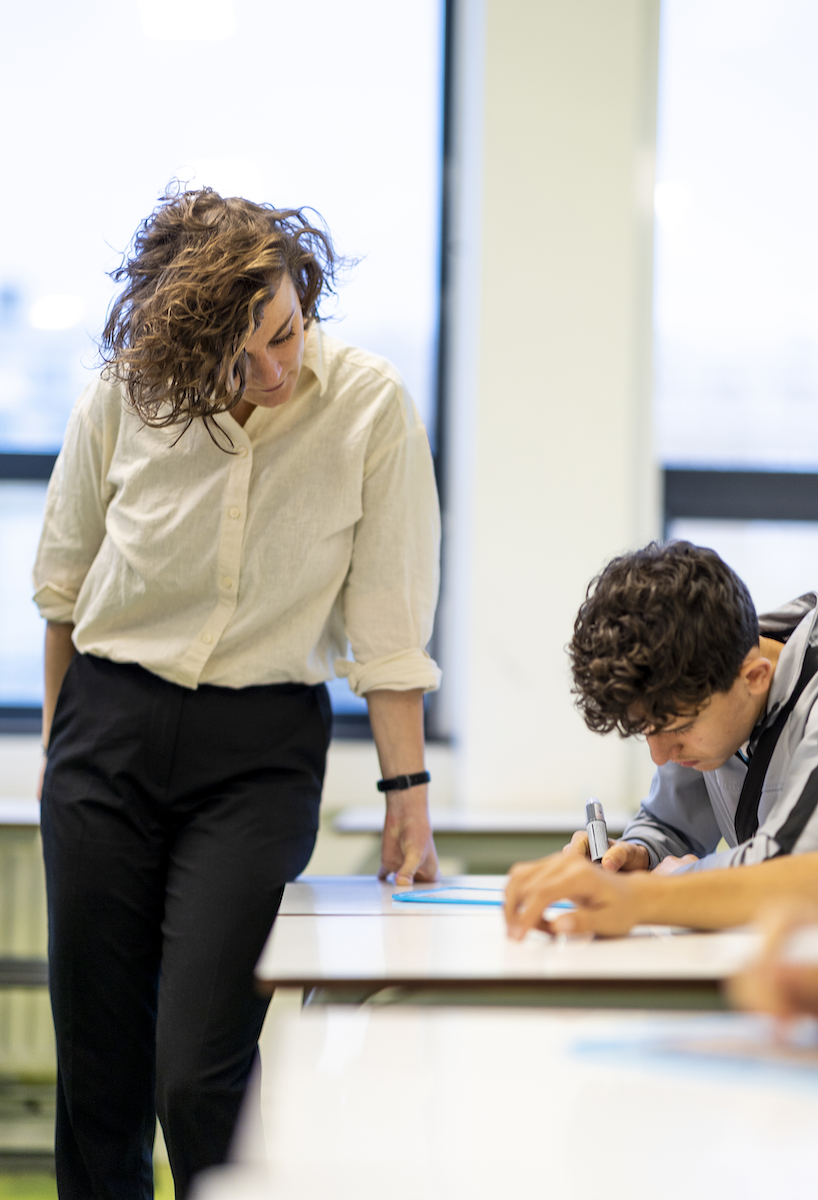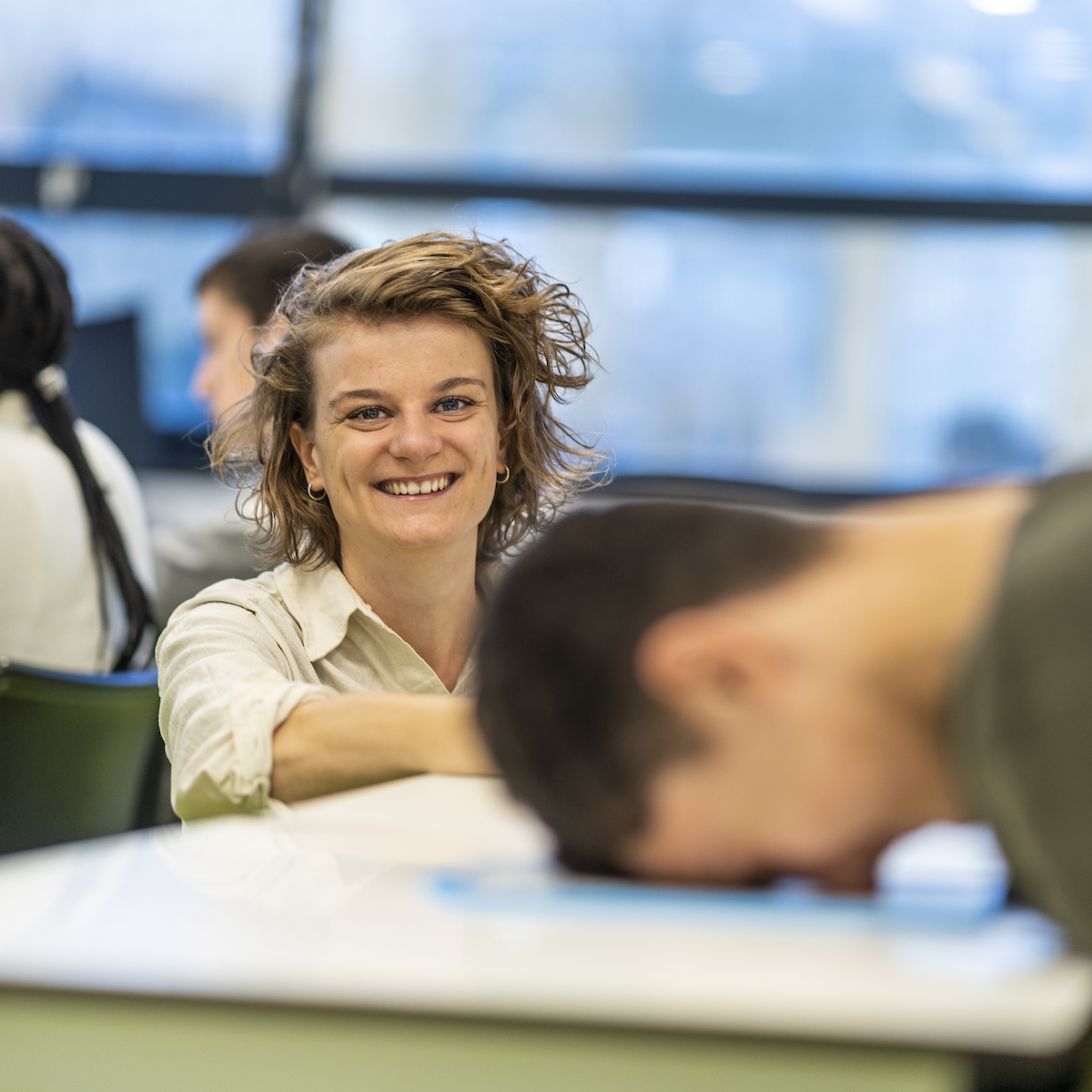Maxe de Rijk: 'You can really make a difference here as a teacher'
Mundus College in Amsterdam has a special 'opportunity class' for students with practical education advice who have more to offer. With extra time and guidance, they can move on to the upper years of pre-vocational secondary education, says teacher and initiator Maxe de Rijk.

Picture: Fred van Diem
The students”, Maxe de Rijk replies immediately. Just ask her why she likes to work in practical education and her face lights up. “They are direct, open students, with their heart on their sleeve. They say what comes to mind, what they feel and experience. I really enjoy teaching that. You always know whether your teaching material has arrived. These are students who have been through a lot, who have found it more difficult to learn at primary school and who often receive less support from home. But they are also very motivated. You can really make a difference here as a teacher.”
Practical education forms a separate pillar in the Dutch education system, intended for pupils who would not be able to cope with pre-vocational secondary education. But some children who leave group 8 with practical school advice can easily go to pre-vocational secondary education. As long as they get the time and guidance to catch up, De Rijk knows from experience. She set up the first pre-vocational secondary education opportunity class a few years ago. 'Practical students' are given an extra year to complete the lower secondary education at pre-vocational secondary education level, and that is bearing fruit. Of the nineteen pupils in the first group, eleven moved on to VMBO basic and four to VMBO framework, the remaining four to MBO entrance (level 1). What makes it extra special: her school, the Mundus College in Amsterdam Nieuw-West, offers all these forms of education under one roof. De Rijk published the book last year Don't stress, we'll make it! about her experiences with the first chance class.
You can read this article for free from the Education magazine of December. Want to stay informed of everything that is happening in education? Join the AOb! And receive the Education magazine every month.
CHECK ALL THE BENEFITS OF MEMBERSHIP
A major cause of the arrears is poverty, according to De Rijk. “When there is stress at home about money, there is little room for other topics. Poverty often also means a bad home, unhealthy food, no breakfast, all things that a student needs to function.” The cabinet recently allocated money to schools to provide breakfast for students who leave home with a low stomach. They have been doing this for much longer at Mundus College. “It is very nice that it will now be paid for by the government. But I would much rather see poverty itself combated: that the minimum wage goes up, that something is done about all those flexible contracts and that students just have breakfast at home.”
Exploration
While the social trend is that many parents try to avoid pre-vocational secondary education with their children, students in the disadvantaged class do their very best to pass pre-vocational secondary education. They are given three years to complete the lower years of pre-vocational secondary education. In concrete terms, this means that they spend two years on the first VMBO year and then one year on the second junior year. The latter 'acceleration' should prevent the transition to the regular upper secondary vocational education from becoming a stumbling block.
(The article continues below the photo)

Picture: Fred van Diem
Part of the program - throughout Mundus College - is a wide range of extracurricular activities. Students choose from a range of 35 different workshops. In the first year they are obliged to spend one hour a week on this, but many students do two or three. “The workshops contribute enormously to the mental well-being of the students. Children are happier and a happier child learns better. We see that learning performance has improved since students can also take piano lessons, dance or play football. It is a great boost for the discovery and development of talents. It also contributes to their exploration. Pupils learn to choose something that suits them and not because their best friend does too.”
The workshops contribute enormously to the mental well-being of the students. Children are happier and a happier child learns better
Another indispensable part of the curriculum is the Personal Development and Socialization course, which De Rijk set up together with colleagues. Two hours a week there is time to talk about what concerns students and about what is happening in the world around them. De Rijk herself teaches the course as a mentor to her chance class. “This course is also part of the success of the chance classes. That students have two hours a week to talk about what they think, how they feel, what they have experienced. I could not have written the book without this subject. I am glad that I can teach the course as a mentor, because that way you get to know your own class very well.” It is a subject without tests and grades, because enough has to be achieved at school anyway. Although it is now mentioned on the report with a letter for insufficient, moderate, sufficient, good or excellent. Because students indicated that they would like to, so that the subject also became more visible to their parents. The assessment is based on effort.
Two scheduled hours a week is of course “one thing”, says De Rijk. “Even here at school I sometimes have to explain why we make time for this. 'What a beautiful profession, but at the expense of which profession has that time gone?' But we really see a big effect, especially since the corona lockdowns. Pupils who take this subject also score higher on a cognitive level in other subjects.”
Self confidence
Many students could use a confidence boost. Thanks to the current education system, they are often told that they are lagging behind others and that is hurtful, says De Rijk. “A primary school recommendation is measured on the basis of an average. Practical education equals three years behind, vmbo basic two years behind, vmbo-t is the average, havo and vwo amount to a learning advantage. If students are below that average, it is very difficult to top it. They do their best and also grow, but because other students naturally also improve, they continue to score lower compared to the average. This causes students to lose confidence in themselves, very painful and unnecessary.”
(The article continues below the photo)

Picture: Fred van Diem
For many students, the selection moment in group 8 comes too early to form a good judgement. Fortunately, schools have revised more recommendations upwards under the guise of 'promising advice'. And to be clear, De Rijk emphasizes: primary schools do what they can. “They are also stuck in the system. In addition, there is a huge teacher shortage. There has been a lot of outages and corona came on top of that. Pupils without parents who can practice math with them after school or pay extra lessons, are the victims. Primary schools here in Nieuw-West are struggling with a much greater teacher shortage than, for example, in Zuid. Students who come to us now have had so many changes of teachers. The result is that we receive students who cannot tell the time. And then it turns out that the teacher of group 8 does not know that, because her colleague of group 7 had dropped out and could not have passed it on.”
Ultimately, the assignment is short and sweet: that every student ends up in a place that fits well, whatever level that is. In addition, vocational education deserves much more appreciation, says De Rijk. “In my book I describe four students who go from practical education to pre-vocational secondary education. In the beginning they were especially very happy, they also thought it was very clever of themselves. And they are doing fantastic now, but they also say: yes, but it is still only pre-vocational secondary education. They come from so far and they have fought so hard for it and then it is still in the head: as a society we think you are just not good enough.”
Super diverse
Maxe de Rijk completed his studies in political science at the University of Amsterdam, fell in love with education and, in his own words, opted for social studies teacher training. She grew up in a multicultural neighborhood in East Amsterdam, where she went to a mixed neighborhood school. Those experiences from her own school days also help her in the classroom. “Growing up between different cultures and different socio-economic backgrounds helps you to put yourself in someone else's shoes.” In addition, Mundus College has a “super-diverse” team of teachers, she says. “Students meet all kinds of people here, so there is always someone who looks like you.”
Growing up between different cultures and different socio-economic backgrounds helps you to put yourself in someone else's shoes
De Rijk describes an exciting moment for her personally in her book. She told her chance class - and later the other classes - that she likes women. “I wanted to be open about it. I also ask for openness from them, so I have to give it myself. Everyone has their biases, including me. I also read articles in the media about gays being abused in the street. But, as is often the case with prejudices, they turned out to be wrong. I've noticed that the relationship with my students has been strengthened because I've been vulnerable. And that I enlarged their world with it - and they enlarged mine. I now walk through the school much more confidently and that is because the students have given me that confidence.”
Maxe de Rijk, 'Don't stress, we're going to make it!', Volt, € 21,99
This is an article from the Education Magazine, which is updated monthly AObmembers on the bus. More about all the benefits of it AObmembership you read here.


